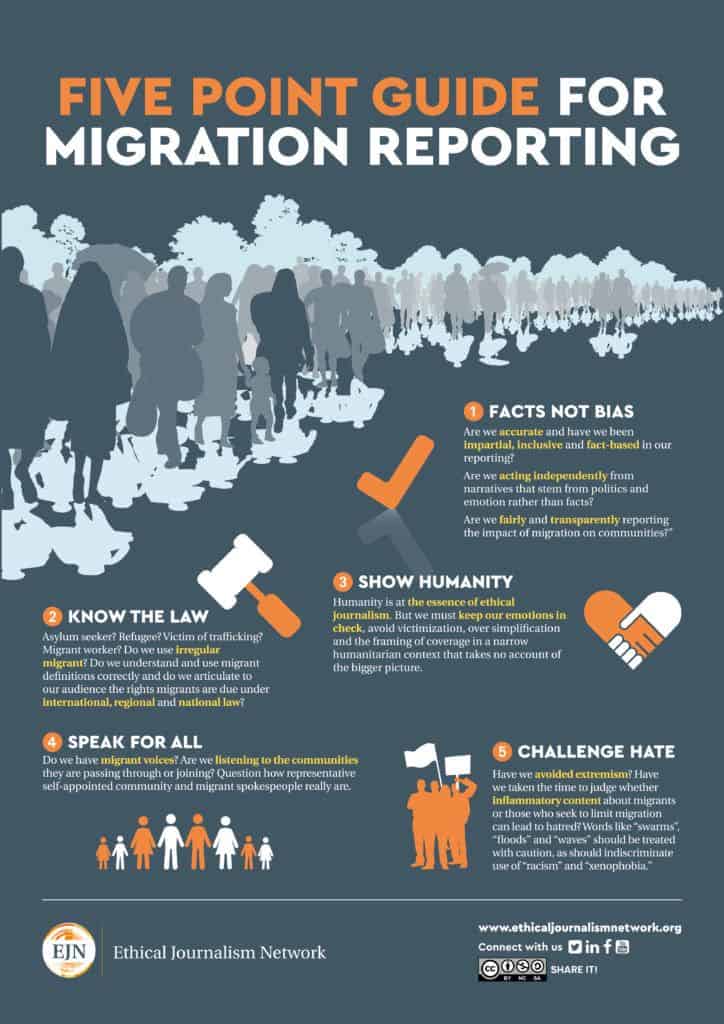EJN launches migration reporting guidelines at GFMD
The Ethical Journalism Network launched new guidelines for migration reporting at the World Forum for Media Development on 21 September in Jakarta, Indonesia.
Our director of campaigns and communications, Tom Law, launched the guidelines at a session on migration reporting on the second day of the conference, where he also addressed a workshop on Policing the cyber space: Self or state regulation.

The new guidelines are a response to the challenges faced by news media when covering migration, that were outlined in the EJN’s Moving Stories report. The report found that despite many examples of excellent coverage journalists often fail to tell the full story and routinely fall into sensationalism and propaganda traps laid by politicians.
The workshop to launch the guidelines was attended by journalists and media development professionals from the Czech Republic, Germany, the Netherlands, Somalia, Sudan, and Tunisia.
Tom Law, the EJN Director of Communications and Campaigns said:
“There was a consensus that migration reporting is one of the biggest challenges facing the news media and will be for years to come. It is essential that media rise to challenge of covering migration and put ethics at the centre of their coverage.”
Jeremy Druker, Executive Director of Transitions – a publisher and a trainer of journalists in Prague – who attended the workshop said:
“It was a great summary of what every journalist should consider when covering migration. I hope that news media around the world use this new resource to guide their reporting on this critical issue.”

Participants at the interactive session suggested that further resources could be developed to compliment the guidelines, including how to conduct solution-based journalism around migration, creating easy-to-digest definitions of legal terms around migration, and other more regionally-focused versions of the guide for journalists in countries where recent flows of migration have stemmed from.

The event, which also looked into ways journalists can define, identify and respond to hate speech, launched the EJN’s 5 –point test for hate speech in seven new languages, including Albanian, Dutch, Indonesian, Macedonian, Serbian, Turkish, Ukrainian.
The test is already available in Arabic, English and French.
For more information or interviews contact, Tom Law at [email protected]


Moving Stories
The EJN’s Moving Stories report, published in December 2015 covers 14 countries, as well as the European Union, highlights:
Missed Opportunities: How journalists and media in Europe failed to raise the alarm about an imminent influx of refugees fleeing war in Syria and Iraq, even though the story was there to be told a year before the crisis broke in 2015;
Hate-Speech: How outrageous anti-migrant or anti-Muslim statements by politicians like Donald Trump in the United States and some European leaders fuelled increasing public concern and hijacked media coverage;
Falling Standards: How media fail to provide detailed and reliable information about the refugee crisis because of a lack of editorial resources or the presence of well-informed journalists able to provide in-depth and sensitive reporting;
Sensationalism: How much journalism is driven by hyperbole, intolerance and distortion with media in confusion over what are the correct terms to use to describe migrants, refugees, and asylum-seekers.
For more information contact Tom at [email protected] or @tomlawmedia.